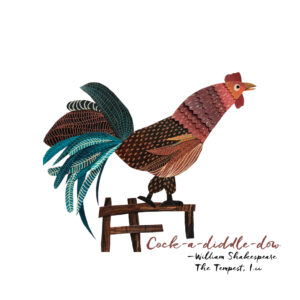Back in September 2016, Shakespeare Geek readers helped make life better by backing Behowl the Moon, a baby board book based on “A Midsummer Night’s Dream”, into existence. I’m very happy to welcome back Erin Nelsen Parekh to tell us about her follow on project “The Wild Waves Whist”, using material from The Tempest.
Maybe you remember reading here about Behowl the Moon, the board book that turns two quotes from A Midsummer Night’s Dream into a story for babies and toddlers. There’s a second book up on Kickstarter now that would make it a series: The Wild Waves Whist, which steals two bits of The Tempest.
https://www.kickstarter.com/projects/172320179/shakespeare-for-babies-real-literature-to-read-on
The Wild Waves Whist will have more Shakespeare-certified animal noises, more rhymes, more funny old language, an island setting brimming with mystery and possibility. It will be a delight and a dare.
Many of you helped bring Behowl the Moon into being by supporting it on
Kickstarter. And once it was made, the pairing of Shakespeare’s words and narrative art caught a good bit of attention (link to http://drivelanddrool.com/press/). Behowl the Moon is just about sold out of its first printing and going back to press!
It’s not probably ever going to be a blockbuster—not every adult wants this kind of wordplay during storytime with a kid. Even if they did, lots of people grow up with no feelings about Shakespeare aside from vague, homework-induced distaste. But among those who love and respect the complex play of image and sound and meaning in Shakespeare’s work, Behowl the Moon finds the perfect audience.

What actually happens when you mix small children and early modern English? My oldest, at two, told me we needed breakfast, “else the Puck a liar call.” A three-year-old remixes songs and quotes: “Twinkle, twinkle, little star, and the wolf behowls the moon.” When I read for a group of kids, usually aged from about one to three or sometimes all the way to six and seven, they hiss for “’scape the serpent’s tongue,” clap on “give me your hands,” lay their heads down at “good night unto you all,” and happily roar, tweet, bray, hoot, and squeak whenever they get a chance. And everybody, everybody, howls.
Toddlers interact with a snippet of unadulterated Shakespeare just as they would any other kids’ book, remembering the bits they like the sound of, puzzling out what’s going on in the pictures, asking questions about the characters. They are hilarious and brave and unexpected. I have to make another one—just to see what they’ll do next.
If you can help me make this, by supporting the project, sharing the link, or telling a friend, you’ll get my endless gratitude—and we’ll get to find out what happens together.
